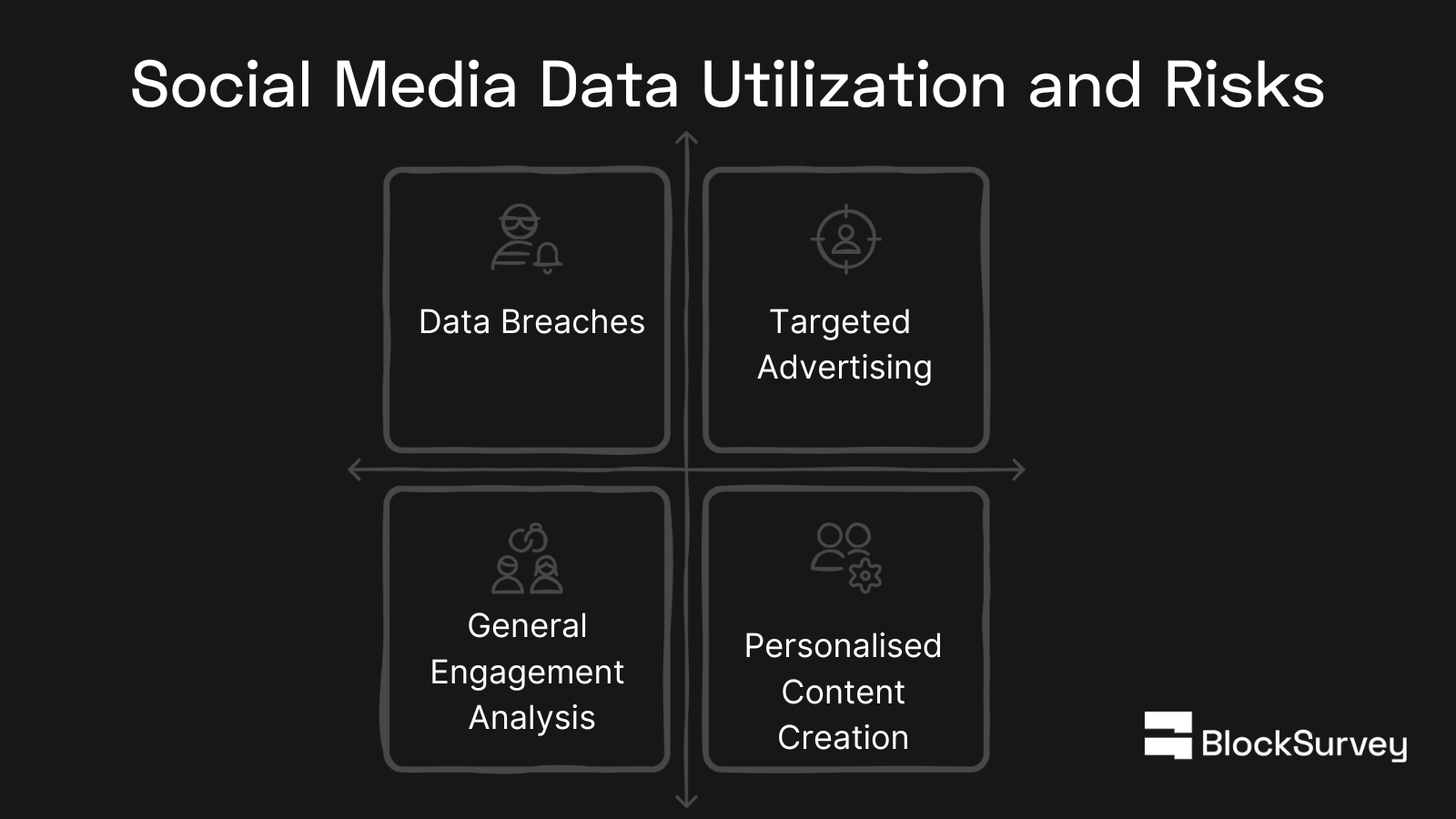Get insights.
Unlock value.
- 14-day free trial
- Set up in minutes
- No credit card required
Social Media Data: A Treasure Trove of Insights, a Minefield of Privacy Issues
For a long time now, social media has been a part of our daily lives. Checking these platforms has become second nature in time but have you ever wondered what happens to the data you leave behind? Every like, comment, and share is tracked, analyzed, and even sold, in order to shape the content that you see online.
The real question, though, is who really controls your social media data? Although companies depend on this data for marketing, users usually have little influence on how their data is handled by these big platforms.
So, procedures with regard to privacy have grown ever more crucial. Safe surveys and questionnaires are redefined with Web3 technologies like encryption, distributed storage, and user ownership. Instead of depending on intrusive surveillance, encrypted surveys, and questionnaires provide a privacy-friendly approach to getting knowledge without violating user anonymity.
How then may companies gather insightful social media data without invading people's privacy?
Social Media Data Collection
To be able to understand the importance of data collection, first, we need to know what is social media data, right?

What Is Social Media Data?
We call every step we take on platforms like X, Instagram, TikTok, YouTube, and more. This means that:
- Likes, shares, comments, and views on posts to analyze engagement and refine their strategies. Some even leverage external services, like getting YouTube views from Views4You, to enhance their visibility and reach.
- Follower counts and interactions with other users.
- Browsing habits, like how long you spend on a post or video.
- Personal details such as age, location, and interests.
As you can see above, no matter what you do leaves a mark on social media platforms as data and each of these companies uses them in different ways to improve their platforms and sometimes for more!
How Businesses, Researchers, and Marketers Use Social Media Data
Businesses generally use social media data to know their audience for better target ads. Then, to improve their goods, they consider consumer behavior, trends, and preferences, to come up with better strategies for their future.
For example, businesses use social media data to produce more personalized content and improve their customer services for their target ads. On the other hand, researchers are relatively more innocent when you compare it to businesses. They generally use these data to study current social trends, online behaviors, and public opinion for majors such as sociology, psychology, and more. Marketers pretty much have the same goal as businesses. Social media data are quite essential for marketers because thanks to social media data, they can easily create effective and powerful strategies.
Before users even ask for it, information offers a chance for businesses to forecast their needs. That's the reason why most of these online ads make us feel like they “know” us!
The Risks of Traditional Data Collection
Yes, social media data is quite useful and makes things much easier, however, we should be aware of the risks of traditional data collection about privacy! Most of the time, users don’t fully comprehend how much information they’re giving away, which can cause big problems for users.
For example, in terms of exposing personal information, users should know that social media data is generally stored in central databases which can be hacked. Also, users should know that they don’t have much authority over how information is being used because they are often shared or sold without clear permission from users.
Additionally, once you put information online it is impossible to delete them. You can delete your accounts, apps, or anything but data remains so these platforms make use of them and tracking goes beyond the social media. This means that some companies follow the user data and activities on different websites and applications.
As you can see, it is understandable that people are demanding more privacy and better ways to control their own data. This situation makes secure data collection tools such as encrypted surveys and decentralized platforms more important.
Balance for Ethical Data Collection
Companies must figure out how to get these data while respecting individual rights and maintaining data security. Transparency, getting permission, and safeguarding user data from abuse the ethical data collecting because if they get information in the wrong way, like by tracking people without their knowledge or without permission, it can hurt trust and get them in trouble with the law.
Here’s why businesses need to focus on privacy-first data collection:
- Customer-Oriented Approach: Privacy is important for everyone, so customers don’t want companies spying on them or using their data without consent.
- Safe Use for Better Reputation: Once brands are labeled for misusing data, it is kind of over because customers will stop trusting them so in order to create a better image, brands should focus on secure social media data usage. Additionally, if data are hacked it costs too much money due to fines, lawsuits, and loss of customers.
Businesses shouldn't use sneaky ways to collect information; instead, they should be honest and open about it, like through privacy-first polls and direct feedback.
Regulations That Protect Social Media Users (GDPR, CCPA, etc.)
Laws have been made by governments all over the world to protect people from bad use of data. For example, some of the most important rules are GDPR (General Data Protection Regulation) and CCPA (California Consumer Privacy Act).
- GDPR: A law in Europe that gives people control over their personal data. Before collecting data, companies need to make sure they have clear permission, and users can request their data to be deleted.
- CCPA: Similar to GDPR, but in the U.S. People can see what information companies have about them and users can opt out of having their data sold to third parties.
Companies aren't allowed to take data and use it however they want because of these laws and these rules push companies to be honest about what they gather, why they gather it, and how they keep it safe.
Shift Towards Consent-Based Surveys & Zero-Party Data
Privacy concerns and stricter laws have pushed companies to collect data in an honest way that relies on consent. Instead of tracking people around on social media without their knowledge, they go straight to surveys, polls, and feedback forms to ask people directly.
This calls for a new approach known as zero-party data. Businesses don't get users' information behind their backs, instead, users choose to share it. This means that the information is more correct and reliable because it comes straight from the customer, it is not only more accurate and reliable but also fosters greater trust. Users feel more comfortable engaging with brands when they understand what data they are sharing and why.
How Businesses Can Leverage Privacy-Focused Surveys for Market Research
One of the most important things about a business is its reputation. Customers are more likely to interact with a business, buy things, and tell others about it if they think the company values their privacy. So, companies should know why the trust between them and their customers is important. For example, I feel safe sharing my opinions, I am more likely to provide honest and useful feedback that can be quite useful for the companies.
So, what can be done here? Well, privacy-focused surveys to get direct insights from social media users can be a good starting point and give companies benefits.
- Instead of using algorithms to guess how people will behave, surveys get straight answers.
- This means that companies can trust the opinions of real users more than data gathered through passive tracking.
- Privacy-first survey tools make sure that users can keep their answers safe by not storing them in a central system that can be hacked.
Why Privacy-Focused Surveys Are the Future of Market Research
Traditional tracking methods are less useful and more dangerous as privacy laws get tighter and people want more control over their data. So, companies must switch to privacy-friendly methods. They can easily:
- Collect high-quality, consent-based insights
- Build a stronger brand reputation
- Stay compliant with data protection laws
- Improve customer trust and engagement
Businesses can use these methods to do surveys in a way that protects privacy, is safe, and gives real value. Companies can build better relationships with customers by collecting data in an open and honest way, instead of collecting data for no reason or by tracking customers in ways that are too intrusive.
Social Media Data: A Treasure Trove of Insights, a Minefield of Privacy Issues FAQ
How does social media data affect the accuracy of targeted ads?
Brands can use data from social media to learn more about what people like, what they look for, and how they interact with content. This lets them show ads that are more appropriate. But if companies use incomplete or old data, the ads might not always match what a person is really interested in.
Can businesses collect social media data without tracking users?
Yes! If companies use privacy-oriented surveys and direct feedback forms to gain their users' permission to gather data, they are exempt from having to follow consumers without knowing. This technique is more moral, creates confidence, and provides more accurate information than covert tracking.
What happens to social media data when a platform shuts down?
If a social media site shuts down, users' info will still be available. Some businesses keep user information for years before they sell or give it to someone else. So, storing data in a way that is both secured and spread out is becoming important.
Can users take control of the data collected about them?
Yes, but it depends on the site and the privacy rules that apply. Consumers can ask for, delete, or opt out of certain data collection methods thanks to laws like GDPR and CCPA. But a lot of sites make this process harder, which is why more people are using Web3 solutions to get more control over their data.
Get insights.
Unlock value.
- 14-day free trial
- Set up in minutes
- No credit card required











